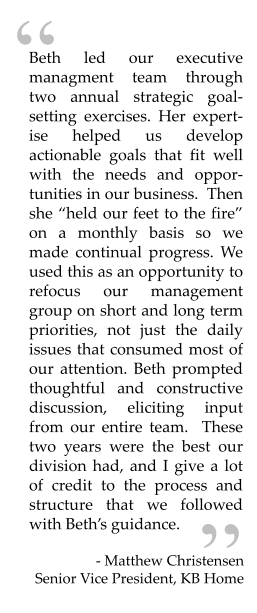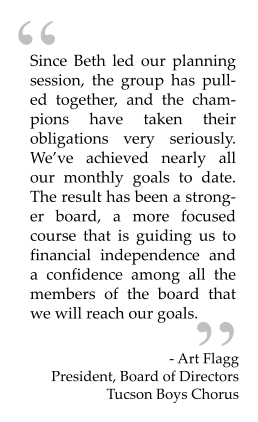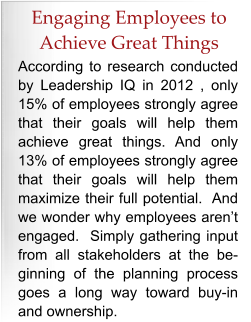Strategic Planning

“Our team can’t get any traction. We have a plan with strategies and goals, but it’s not happening. How can I get us to be more accountable for our results?”
Key to Success: A Disciplined Process
A leader who’s consistently hitting goals has a cohesive team that is crystal clear on where they’re headed, why it’s important to get there, and who is accountable for what. Everyone owns the plan because they’ve followed a structured process to create it and to manage their progress. They look for ways to work together to achieve their goals, and they keep a watchful eye on how they’re doing. Because the rest of the organization has been brought onboard, the team has all the support it needs to turn the plan into a reality.
 Why Strategic Plans Fail
Why Strategic Plans Fail
When a team spins its wheels trying to achieve a plan, people take the heat for not performing, but the culprit is often the plan itself. A surprising number of leadership teams – whether at the head of companies, divisions, departments, functions or projects – struggle, because they don’t have a clear vision of success, much less a detailed roadmap to follow. In other words, they don’t have a solid strategic plan.
More often than not, teams don’t put enough time and attention into planning. A combination of enthusiasm and tight schedules can tempt the leader to launch headfirst into throwing objectives up on a white board. After all, who knows better what the team needs to accomplish? Then without having agreed on exactly how they’ll tackle their goals, the team is dispatched to go make it happen. Communicating the heart of the plan to the rest of the organization is usually a random effort, without the proper context to make it understandable. Poor communication and lack of inclusion can lead to resistance, or in the worst cases, sabotage. Often within a year, the plan has already begun to gather dust on a shelf, and the planners themselves have trouble recalling what was in it.
 How a Structured Strategic Planning Process Leads to Success
How a Structured Strategic Planning Process Leads to Success
When I coach a team through their strategic planning process, I provide the structure they need in order to be thoughtful and deliberate in both the creation of the plan and their execution of it.
We start at a high altitude and then work into the details, answering important questions like:
- What are we here for? [Mission]
- What do we want for our organization? [Vision]
- Who will we be? [Values]
- What have we learned from our past? [Lessons]
- What gets in our way? [Limiting Belief]
- What is our #1 priority? [Burning Imperative]
- What needs to happen? [Goals]
- What does success look like? [Metrics/Descriptions]
- How will we stay on track? [Accountabiity System]
- How do we enroll everyone else in our plan? [Communication]
Everyone in the organization has perspectives and thoughts to contribute, and each one of them is valuable. The same goes for outside stakeholders. The leadership team comes to the planning session having sought out these opinions, and I help them corral the ideas and find common themes. This input helps shape their answers to these questions and fosters ownership of the final plan.
I hold them to this process, making sure each step gets everyone’s full attention. At the same time, I keep close tabs on the energy in the room, flexing the agenda and my facilitation as needed. Before they wrap up, I make sure they set specific actions and milestones and agree on a schedule for progress updates and reality checks throughout the life of the plan.
 Communicating the plan to the organization is the most critical next step, with special emphasis on an inspiring and vividly descriptive vision. When the leadership team cascades their goals throughout the organization and every key message connects to the vision and burning imperative, everyone knows where they’re headed, why it’s important, and what role they play in the organization’s success.
Communicating the plan to the organization is the most critical next step, with special emphasis on an inspiring and vividly descriptive vision. When the leadership team cascades their goals throughout the organization and every key message connects to the vision and burning imperative, everyone knows where they’re headed, why it’s important, and what role they play in the organization’s success.
Still, great teams with the most solid strategic plans will wander or hit a wall if accountability is lacking. When I coach teams through the planning process, I stay with them through the execution, and there’s nowhere to hide. But there’s also no tolerance for blame or turf-protection. When teammates hold themselves and others accountable, they create a healthy culture of trust, mutual respect and support.
 Final Thoughts on Coaching Teams as They Plan
Final Thoughts on Coaching Teams as They Plan
It’s virtually impossible for a team leader to fully participate in the strategic planning process and manage the big picture at the same time. Staying focused takes an enormous amount of discipline; energy waxes and wanes; enthusiasm can cause teams to set ridiculously difficult goals; and pressure can lead to sandbagging. When members feel their contributions aren’t valued, or when the team just gets exhausted, a “whatever” attitude prevails, and it’s usually left to you as the leader to make the call. Having a team coach lead your strategic planning effort allows you to focus on the plan and your people, rather than the process.
